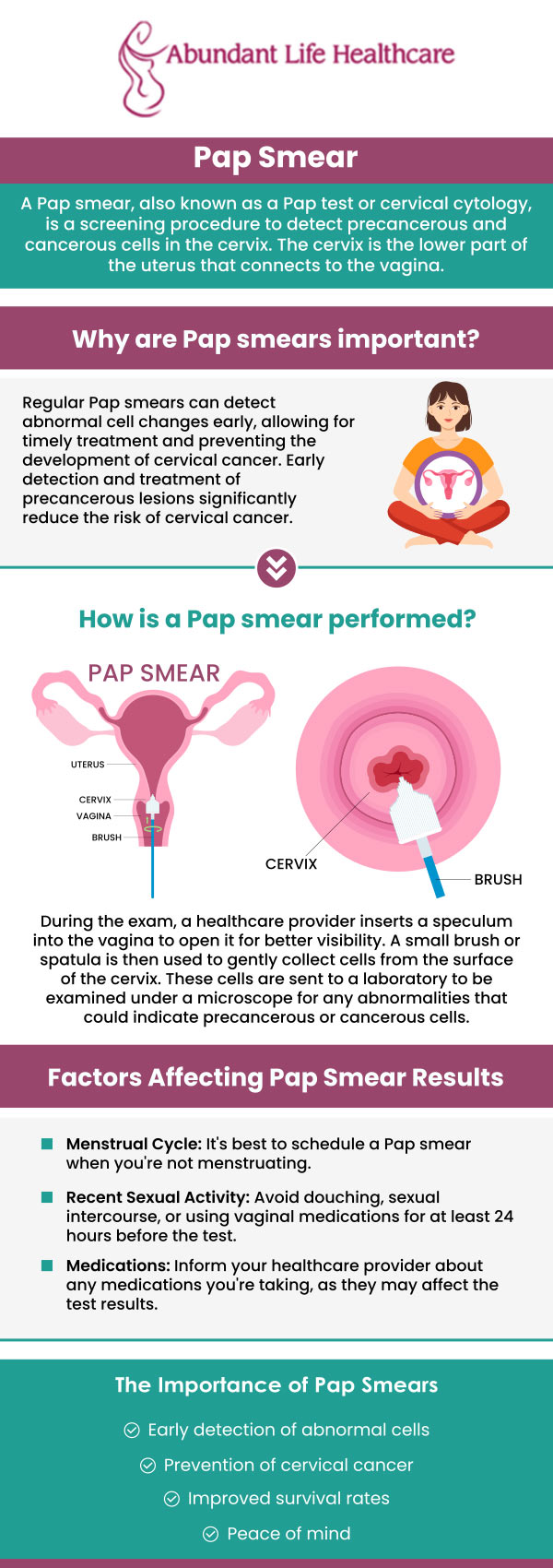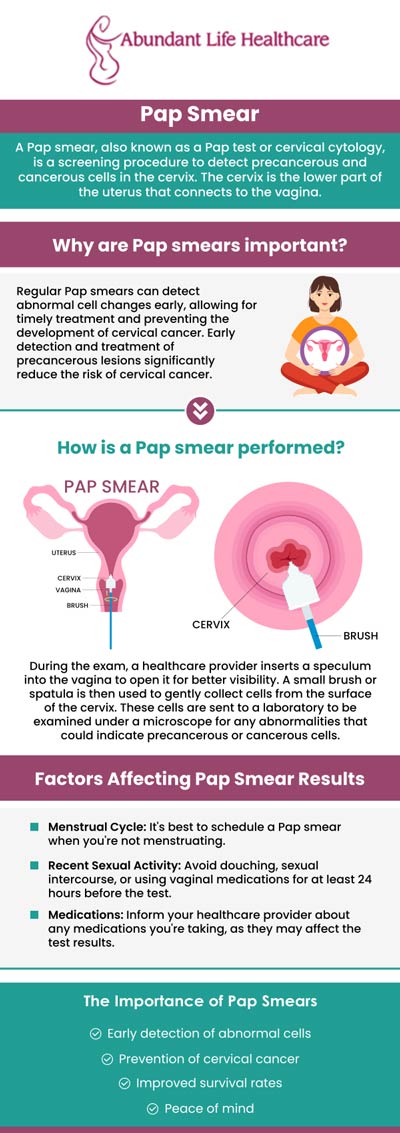Pap Smears Specialist in Lawrenceville, GA
Pap smear is a technique used to screen women for cervical cancer. It collects cells from your cervix, which is the lower, thin end of your uterus near the top of your vagina. Detecting cervical cancer early with a Pap smear increases your chances of survival. Dr. Marc Jean-Gilles, DO, FACOG, provides pap smears at Abundant Life Healthcare. For more information, contact us or book an appointment online. We are conveniently located at 601A Professional Drive, Suite 370, Lawrenceville, GA 30046.




Table of Contents:
How often do you need a Pap smear?
Is a Pap smear the only way to test for STDs?
Do smear tests pick up STDs?
Can HSV be detected in a Pap smear?
A Pap smear, a Pap test, is a routine screening doctors use to test for cervical cancer. Generally, it’s recommended to receive a Pap test every 3 years for women between the ages of 21 and 65. However, if you have certain risk factors, your healthcare provider may recommend you come in for more frequent Pap smears. These risk factors include:
• Previous Pap smears showed precancerous or cancerous cells.
• Weakened immune system due to an organ transplant or chemotherapy.
• HIV infection.
• A history of smoking.
• Exposure to diethylstilbestrol before birth.
• A family history of cervical cancer.
If you’ve undergone a total hysterectomy or are over 65, your doctor will likely decide you no longer need routine Pap smears. Otherwise, it’s highly important to receive regular screenings, as Pap tests allow for the early detection and treatment of cervical cancer, which can be deadly.
Pap smears are used to look for cell changes in the cervix, as this is a sign of cervical cancer. While Pap smears can detect cell changes that are caused by human papillomavirus (HPV) instead of cancer, it is not a reliable method of screening for sexually transmitted diseases (STDs). If HPV is left untreated, it can develop into cervical cancer. That’s why it’s very important to receive screenings for STDs alongside routine Pap smears.
To test for the presence of chlamydia or gonorrhea, a cervical swab is performed. Sometimes, this procedure is confused with a Pap smear, but it is different as healthcare providers are assessing the presence of infection rather than cancerous or precancerous cells. Additionally, chlamydia and gonorrhea can also be observed through a urine test.
In summary, a Pap smear is not a way of identifying STDs, however, this screening can detect the presence of high-risk HPV. If you believe you have been exposed to a sexually transmitted disease, our staff can guide you on the type of testing you need.
In short, Pap smears are not designed to pick up STDs. However, in some cases, human papillomavirus (HPV) can be observed through a Pap smear. In addition, HPV can be present but not detected through a Pap smear. For this reason, you should not rely on this screening to identify the presence of sexually transmitted diseases.
If you let your medical professional know in advance, an STD swab can be performed at the same time as your Pap smear. It’s important to receive STD testing, as untreated conditions can result in fertility problems and increase your risk of developing cervical cancer. You should ask for STD testing if:
• You have a new sexual partner.
• You have multiple partners.
• You have had unprotected sex recently.
• You have symptoms of an STD.
• Your sexual partner reports symptoms of an STD.
Overall, both Pap smears and STD testing are highly important for safeguarding your reproductive health.
Herpes simplex virus (HSV) is a common sexually transmitted infection that can be spread through skin-to-skin contact. It’s important to understand that routine STD checks and Pap smears do not adequately test for HSV.
If you suspect you have HSV, you should let your healthcare provider know so they can guide you on the type of testing you need. Most commonly, HSV is diagnosed through a physical pelvic examination. In addition, as HSV can be difficult to diagnose in between outbreaks, a blood test is often performed to look for antibodies to the herpes virus.
Pap smears are highly important tools for detecting precancerous and cancerous cervical cells, however, they do not reveal the presence of HSV. Our dedicated professionals are here to help you safeguard your reproductive health and provide accurate HSV testing alongside other screenings such as Pap tests. For more information, contact us or request an appointment online. We are conveniently located at 601A Professional Drive, Suite 370, Lawrenceville, GA 30046. We serve patients from Lawrenceville GA, Suwanee GA, Snellville GA, Duluth GA, Dacula GA, Lilburn GA, Loganville GA, Auburn GA, and surrounding areas.
Check Out Our 5 Star Reviews


Additional Services You May Like

Additional Services You May Like
- Obstetrics
- Pregnancy
- Gynecologist
- Birth Control
- Labiaplasty
- Microblading
- Weight Loss
- Semaglutide GLP-1
- Pap Smears
- Pelvic Pain
- Laser Hair Removal
- In House Ultrasound (Including 3D)
- Vaginal Birth After C-Section (VBAC)
- Pregnancy As High Risk
- Multiple Gestations
- Postpartum Counseling
- 24hour/365days On Call Service
- Annual Exam
- Abnormal Uterine Bleeding
- Management Of Endometriosis
- Ultrasound
- Pelvic Organ Prolapse
- Urinary Incontinence
- Perimenopause And Menopause
- Sexual Dysfunction
- Fat Freeze (Like Cool Sculpting)
- Body Contouring
- Ozempic
- Civil Surgeon
- Hormone Replacement Therapy
- Immigration Medicine
- Biote Hormone Pellets
- GLP-1
- Peptide Therapy




